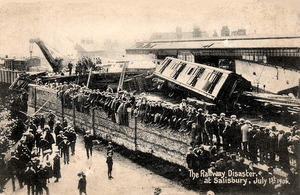Salisbury rail crash
 | |
| Date | 1 July 1906 |
|---|---|
| Time | 1:57 am |
| Location | Salisbury railway station, Wiltshire |
| Coordinates | 51°04′15″N 1°48′15″W / 51.0708°N 1.8042°WCoordinates: 51°04′15″N 1°48′15″W / 51.0708°N 1.8042°W |
| Country | England |
| Rail line | West of England Main Line |
| Operator | London and South Western Railway |
| Cause | Overspeed on curve |
| Statistics | |
| Trains | 3 |
| Passengers | 43 |
| Deaths | 28 |
| Injuries | 11 |
| List of UK rail accidents by year | |
In the Salisbury rail crash of 1 July 1906, a LSWR boat train from Plymouth's Friary railway station to London Waterloo station failed to navigate a very sharp curve at the eastern end of Salisbury railway station. The curve had a speed limit of 30 mph, but the express had been travelling at more than 70 mph. The train was completely derailed, and smashed into a milk train and a light engine, killing 28 people.
Overview
The accident occurred at the same time as a short cut of the rival Great Western Railway was opening, and it was claimed that the driver of the crashed train was trying to show that his railway was capable of competitive speeds. It was also rumoured that passengers – mostly rich New Yorkers travelling to London from the transatlantic port at Plymouth – had bribed the driver to run the train as fast as possible, but there was not any evidence of this, and if anything the train had lost time earlier. Conversely, it was stated that drivers often ran through Salisbury very fast on these trains to "get a run" at the following hill. The engine was a new LSWR L12 class 4-4-0 with a higher centre of gravity than the earlier T9 class. The most likely cause of the accident is that the driver simply did not realise the level of risk he was running, particularly as this was the first occasion on which he had taken a non-stopping train through Salisbury. Also, steam locomotives at this time, and for half a century afterwards, were not fitted with speedometers.
As a result of the crash, all trains were required to stop at Salisbury station from that point onwards (the boat train at the time had no passenger stops from Plymouth to London Waterloo, although locomotives were changed at Templecombe[1]). The speed limit on the curve east of Salisbury was also reduced to 15 mph, a limit still effective today.
There is a memorial tablet to the 28 dead (including the driver, two firemen and the guard) in Salisbury Cathedral.
The accident was the second in a series of three derailments due to excessive speed at night in a 16-month period. The others were at Grantham 1906 and Shrewsbury 1907. All three resulted in deaths, including the footplate crews; the cause in each case was recorded as Driver Error but there has been much speculation since.
In 2006, historian Frogg Moody organised a memorial service at Salisbury Railway Station.
See also
Similar accidents
- Amagasaki rail crash – 2005 – Overspeed through sharp curve.
- Morpeth Railway Station – three occasions, overspeed through sharp curve.
References
- ↑ British Railway Disasters. Ian Allan Ltd. 1996.
- Hamilton., J.A.B. British Railway Accidents of the 20th Century (reprinted as Tracks to Disaster).
- Nock, O.S. (1980). Historic Railway Disasters (2nd ed.). Ian Allan Ltd.
- Pattenden, Norman (2001). Salisbury 1906 – An answer to the enigma?. Swindon: South Western Circle. ISBN 0-9503741-6-4.
- Rolt, L.T.C. (1956 (and later editions)). Red for Danger. Bodley Head / David and Charles / Pan Books. Check date values in:
|date=(help)
External links
- Salisbury (1906) – description of the crash on the Danger Ahead website
- Official Board of Trade report (1906) at railwaysarchive.co.uk